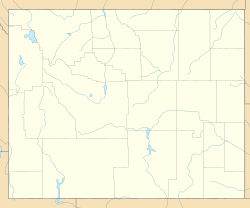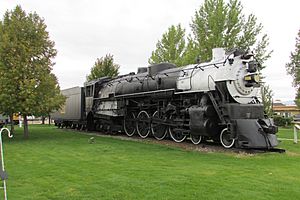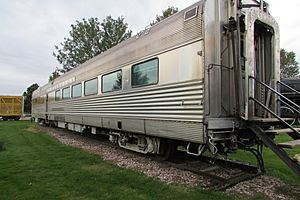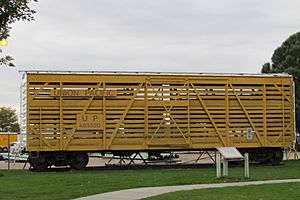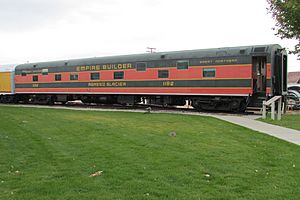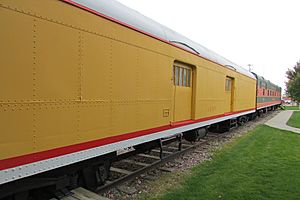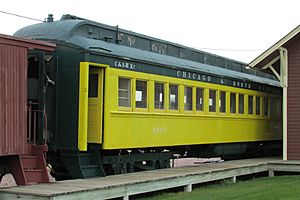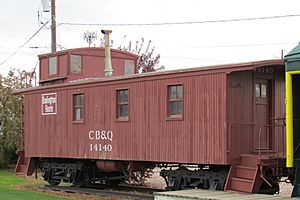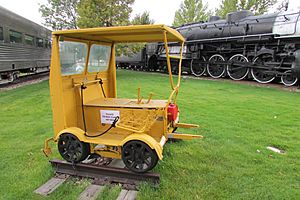Douglas station (Wyoming) facts for kids
Quick facts for kids |
|
|
Fremont, Elkhorn & Missouri Valley Railroad Passenger Depot
|
|
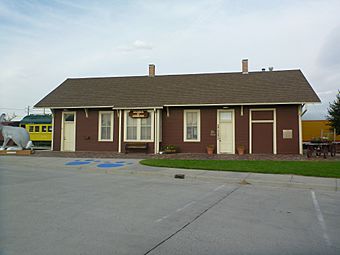
The Douglas Interpretive Center in 2010
|
|
| Location | 121 Brownfield Rd., Douglas, Wyoming |
|---|---|
| Area | less than one acre |
| Built | 1887 |
| Built by | Chicago & Northwestern Railroad |
| Architectural style | Late Victorian, Standardized railroad plans |
| NRHP reference No. | 94000741 |
| Added to NRHP | August 3, 1994 |
Imagine a time when trains were the main way to travel and move goods across the country! The Fremont, Elkhorn & Missouri Valley Railroad Passenger Depot in Douglas, Wyoming is a cool old building that tells the story of those days. It's also known as the Douglas Railroad Interpretive Center today.
This train station was built way back in 1886. It was meant to be the end of the line for the Fremont, Elkhorn and Missouri Valley Railroad. Douglas was a brand new town then, and the railroad wasn't sure if it would grow big.
Right after the depot was built, Douglas faced some tough times. There was a sickness called typhoid fever and a very cold winter. Because of this, the railroad decided to extend its tracks to Casper instead. The town of Douglas got smaller for a while.
But Douglas didn't give up! By 1910, it had grown a lot, partly because it hosted the Wyoming State Fair. The fair brought many people and goods by train. Oil was also discovered in the area, which meant more train traffic.
Later, in the 1950s, coal mining started nearby. The railroad needed bigger facilities to handle all the new trains. So, the original depot closed, and a larger one was built. In 1990, the city of Douglas bought the old depot. They turned it into a museum where you can learn all about trains!
What the Old Train Station Looks Like
This old train station is a simple, rectangular building. It's about 80 feet long and 26 feet wide. It was built using a common design that many small train stations had back then.
One special feature is a part that sticks out on the side facing the tracks. This was called a "bay." It allowed the stationmaster to look far down the tracks in both directions. Inside, the building had five main areas:
- A waiting room for passengers.
- An office for the stationmaster.
- Bathrooms.
- A space for handling freight (goods).
- A storage area for freight.
The original wooden details inside the building are still there today.
In 1994, this historic depot was added to the National Register of Historic Places. This means it's an important building that should be protected. The city of Douglas opened it as the Douglas Railroad Interpretive Center in 1995. Here, you can see real locomotives, train cars, and other railroad equipment.
Cool Trains and Cars You Can See
The Douglas Railroad Interpretive Center has several amazing old train cars on display. Each one has its own story!
| Train Type | Number | Built | Retired | Fun Facts |
|---|---|---|---|---|
| Chicago, Burlington & Quincy Railroad (CB&Q) Steam Locomotive | # 5633 | 1940 | 1962 | This huge engine weighs 317 tons! It was one of the last steam locomotives built for the Burlington railroad. It pulled fast freight and heavy passenger trains. You can't go inside this one. |
| Chicago, Burlington & Quincy Railroad (CB&Q) Dining Car | # 196 | 1947 | 1972 | This car is half kitchen and half dining room. It could seat 48 people! It was called the "Silver Salver" and was used on famous trains like the Zephyr. |
| Union Pacific Railroad Double Deck Stock Car | # 48330D | 1914 | 1964 | This car moved animals like pigs and sheep. It has two floors inside! It started as a boxcar for dry goods and was changed into a stock car in 1936. |
| Great Northern Railway (GN) Sleeping Car | # 1182 | 1950 | 1972 | This sleeping car had 20 compartments for passengers. It was named the "Augassiz Glacier" and traveled on the "Western Star" train from Chicago to Seattle. |
| Union Pacific Railroad Baggage Car | # 1897 | 1911 | 1961 | This car was used to carry mail, baggage, and even fresh produce. It was built for the Oregon Short Line Railroad, which was part of Union Pacific. |
| Chicago & Northwestern Railway (C&NW) Day Coach | # 1886 | 1884 | 1961 | This coach could seat 72 people! It was originally made of wood. In 1915, it was updated with steel sides and electric lights. It was used on many famous routes. |
| Chicago Burlington & Quincy Railroad (CB&Q) Wooden Caboose | # 14140 | 1884 | 1958 | This is the oldest train car at the museum! It was built for freight trains and served as an office and sleeping area for the train crew. |
| Fairmont Motor Car | # 217980 | 1960? | This small, single-seater car was used to inspect the tracks. Railroad workers also used motor cars to travel along the rails. They were slow, going about 30 miles per hour. |
 | Jackie Robinson |
 | Jack Johnson |
 | Althea Gibson |
 | Arthur Ashe |
 | Muhammad Ali |


